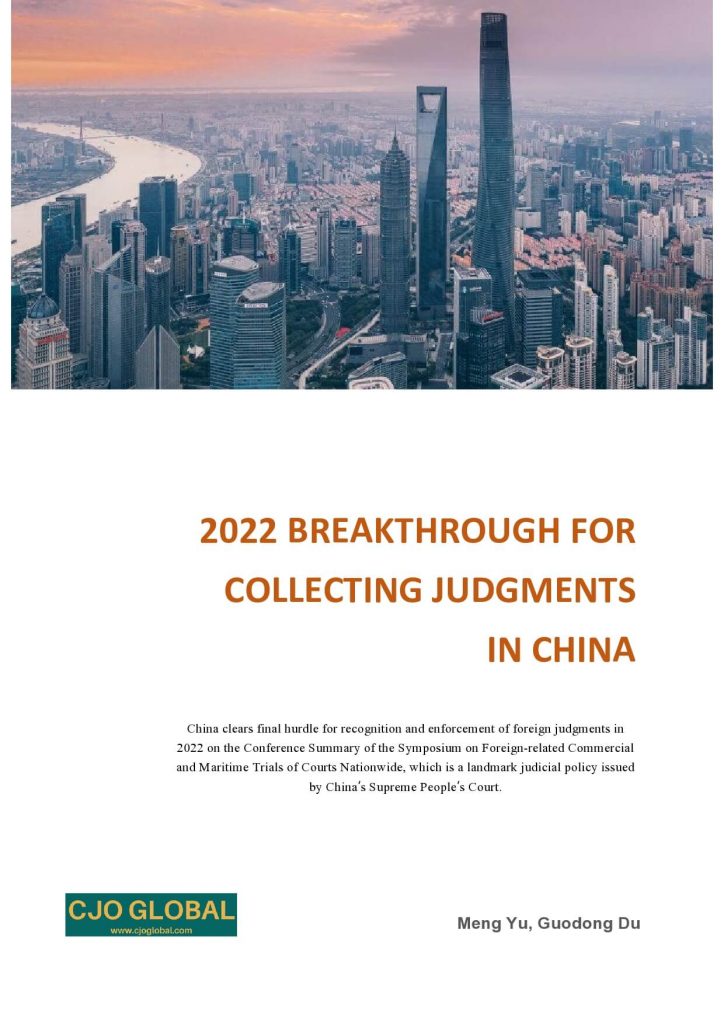How Chinese Courts Review Applications for Enforcement of Foreign Judgments: Criteria and Scope of Application – Breakthrough for Collecting Judgments in China Series (II)
Key takeaways:
- In the absence of pertinent international or bilateral treaties, the examination criteria of the 2021 Conference Summary, including reciprocity as a prerequisite for filing an application, would apply. In other words, the existence of ‘treaty or reciprocity’ remains to be the precondition for Chinese courts to review applications for recognition and enforcement of foreign judgments.
- Although there are no explicit provisions on the principle of reciprocity in Chinese law, different variants of reciprocity — de facto reciprocity, de jure reciprocity, and presumptive reciprocity — have been tested in judicial practices or seen in judicial documents. The 2021 Conference Summary clarified, for the first time, the criteria for determining reciprocity.
- The 2021 Conference Summary will not be applicable to the recognition and enforcement of relevant judgments of bankruptcy, intellectual property, unfair competition, and anti-monopoly cases.
Related Posts:
- China Issues Landmark Judicial Policy on Enforcement of Foreign Judgments – Breakthrough for Collecting Judgments in China Series (I)
- How Chinese Courts Review Applications for Enforcement of Foreign Judgments: Criteria and Scope of Application – Breakthrough for Collecting Judgments in China Series (II)
- How Chinese Courts Determine Reciprocity in Foreign Judgment Enforcement – Breakthrough for Collecting Judgments in China Series (III)
- How Chinese Courts Identify Foreign Judgments as Final and Conclusive? – Breakthrough for Collecting Judgments in China Series (IV)
- What Documents to Prepare for Enforcing Foreign Judgment in China – Breakthrough for Collecting Judgments in China Series (V)
- How to Write an Application for Enforcing Foreign Judgment in China – Breakthrough for Collecting Judgments in China Series (VI)
- Conditions for Enforcement of Foreign Judgments in China – Breakthrough for Collecting Judgments in China Series (VII)
- Where to File Application for Enforcing Foreign Judgments in China – Breakthrough for Collecting Judgments in China Series (VIII)
- Can Applicant Seek Interim Measures from Chinese Courts? – Breakthrough for Collecting Judgments in China Series (IX)
- Case Filing, Service of Process and Withdrawal of Application – Breakthrough for Collecting Judgments in China Series (X)
- How Chinese Courts Ensure Impartiality in Enforcing Foreign Judgments: Ex Ante Internal Approval and Ex Post Filing- Breakthrough for Collecting Judgments in China Series (XI)
China published a landmark judicial policy on enforcement of foreign judgments in 2022, embarking on a new era for judgment collection in China.
The judicial policy is the “Conference Summary of the Symposium on Foreign-related Commercial and Maritime Trials of Courts Nationwide” (hereinafter the “2021 Conference Summary”, 全国法院涉外商事海事审判工作座谈会会议纪要) issued by the China’s Supreme People’s Court (SPC) on 31 Dec. 2021.
As part of the ‘Breakthrough for Collecting Judgments in China Series’, this post introduces Article 33 of the 2021 Conference, addressing, among others, the criteria for Chinese courts to review applications for recognition and enforcement of foreign judgments.
Texts of the 2021 Conference Summary
Article 33 of the 2021 Conference Summary [Examination Criteria and Scope of Application]:
“When trying a case applying for recognition and enforcement of a foreign judgment or ruling, the people’s court shall, in accordance with Article 289 of the Civil Procedure Law and Paragraph 1 of Article 544 of the Judicial Interpretation of the Civil Procedure Law, first examine whether the country where the judgment is rendered and China have concluded or acceded to international treaties. If yes, the pertinent international treaty shall prevail; if no, or if yes but in the absence of relevant provisions in the international treaty, the specific examination criteria of the 2021 Conference Summary may be applicable.
The 2021 Conference Summary will not be applicable to the recognition and enforcement of relevant judgments of bankruptcy, intellectual property, unfair competition, and anti-monopoly cases due to the geographical attributes and particularity thereof.”
Interpretations:
I. On what basis do Chinese courts examine applications for recognition and enforcement of foreign judgments?
1. If the country where the judgment is rendered has concluded an international or bilateral treaty on the recognition and enforcement of judgments with China, the Chinese court shall examine the application for recognition and enforcement of foreign judgments in accordance with such international or bilateral treaty.
2. In the absence of a pertinent treaty, the Chinese court will examine these applications in accordance with the principle of reciprocity. Although there are no explicit provisions on the principle of reciprocity in Chinese law, different variants of reciprocity — de facto reciprocity, de jure reciprocity, and presumptive reciprocity — have been tested in judicial practices or seen in judicial documents. The 2021 Conference Summary clarified the criteria for determining reciprocity for the first time (see Part III of this Series). It can be said that the 2021 Conference Summary, as the consensus of Chinese courts, has provided a basis for Chinese judges to determine reciprocity for the first time and to examine such applications accordingly.
3. In the absence of relevant provisions in international or bilateral treaties, the 2021 Conference Summary can fill the loopholes to come extent. Chinese courts will examine these matters involved in foreign judgments according to the 2021 Conference Summary.
II. With which countries has China concluded pertinent international and bilateral treaties?
1. International treaties
China has signed, but not yet ratified, the Convention on Choice of Court Agreements (2005 Choice of Court Convention). China has not yet acceded to the Convention on the Recognition and Enforcement of Foreign Judgments in Civil or Commercial Matters (the “Hague Judgments Convention”). Therefore, these two treaties cannot, at least at the current stage, be applied as the basis for the Chinese court to examine applications for recognition and enforcement of judgments of relevant contracting states.
2. Bilateral treaties
To date, China and 39 States have concluded bilateral judicial assistance treaties, among which 35 bilateral treaties, include the judgment enforcement clauses. For the judgments of these countries, China will examine their applications for recognition and enforcement in accordance with these bilateral treaties.
France, Spain, Italy and Russia are among these 35 countries.
For more about bilateral judicial assistance treaties that China and 39 States have concluded, please read ‘List of China’s Bilateral Treaties on Judicial Assistance in Civil and Commercial Matters (Enforcement of Foreign Judgments Included)’.
III. For the judgments of most countries, Chinese courts will examine their applications for recognition and enforcement according to the 2021 Conference Summary
In addition to the above-mentioned 35 countries, the Chinese courts will examine applications for recognition and enforcement of judgments of other countries in China based on the 2021 Conference Summary.
Some common major trading partners of China, such as the US, the UK, Germany, Japan, South Korea, Australia, Canada, and New Zealand, fall into this scope.
IV. Exclusion of bankruptcy cases
The recognition and enforcement of bankruptcy judgments will be governed by the PRC Bankruptcy Law. The provisions of the Bankruptcy Law are similar to Part I above.
China has already recognized some foreign bankruptcy judgments. We believe that Chinese courts will keep opening the door to such judgments in the future.
It is very likely that China may formulate special rules, such as another conference summary or a more formal and legally binding document (say, judicial interpretation), for cross-border bankruptcy cases.
V. Exclusion of intellectual property, unfair competition and anti-monopoly cases
These cases may not be recognized and enforced in China. This is similar to the exclusion of such cases in the Hague Judgments Convention.
Do you need support in cross-border trade and debt collection? CJO Global's team can provide you with China-related cross-border trade risk management and debt collection services, including: (1) Trade Dispute Resolution (2) Debt Collection (3) Judgments and Awards Collection (4) Anti-Counterfeiting & IP Protection (5) Company Verification and Due Diligence (6) Trade Contract Drafting and Review If you need our services, or if you wish to share your story, you can contact our Client Manager: Susan Li (susan.li@yuanddu.com). If you want to know more about CJO Global, please click here. If you want to know more about CJO Global services, please click here. If you wish to read more CJO Global posts, please click here.










Pingback: China Issues Landmark Judicial Policy on Enforcement of Foreign Judgments - Collect a Judgment in China - CJO GLOBAL
Pingback: How Chinese Courts Determine Reciprocity in Foreign Judgment Enforcement - CJO GLOBAL
Pingback: How Chinese Courts Identify Foreign Judgments as Final and Conclusive? - CJO GLOBAL
Pingback: What Documents to Prepare for Enforcing Foreign Judgment in China - CJO GLOBAL
Pingback: How to Write an Application for Enforcing Foreign Judgment in China - CJO GLOBAL
Pingback: Conditions for Enforcement of Foreign Judgments in China - CJO GLOBAL
Pingback: China Clears Final Hurdle for Recognition and Enforcement of Foreign Judgments in 2022 - CJO GLOBAL
Pingback: Where to File Application for Enforcing Foreign Judgments in China - CJO GLOBAL
Pingback: Can Applicant Seek Interim Measures from Chinese Courts? - CJO GLOBAL
Pingback: Case Filing, Service of Process and Withdrawal of Application - CJO GLOBAL
Pingback: How Chinese Courts Ensure Impartiality in Enforcing Foreign Judgments - CJO GLOBAL